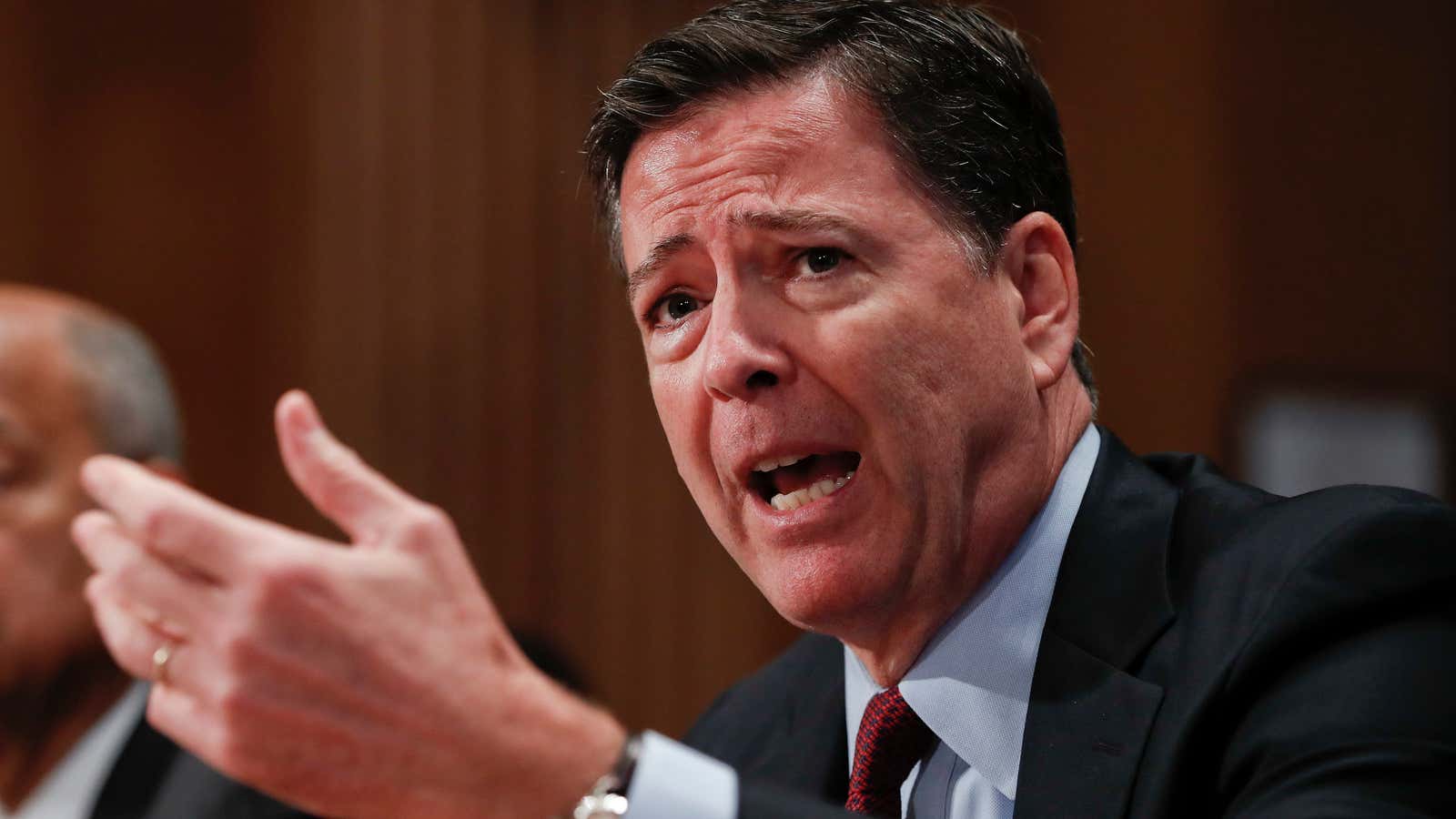FBI director James Comey lit a political fire yesterday (Oct. 28) when he notified Congress that the bureau had discovered new emails tied to its investigation of Hillary Clinton’s private email server. Word of Comey’s action quickly spread after Republican representative Jason Chaffetz, who chairs the House Oversight Committee, tweeted a missive declaring, ”Case reopened”—although technically, the FBI investigation was never closed.
Now that the smoke has cleared, Comey is facing heavy criticism for his choice to make the big announcement, which reportedly went against the wishes of attorney general Loretta Lynch and traditional Justice Department practices. Clinton’s staunchest allies argue that Comey needn’t have made the announcement at all. Others, including Republicans, say he better unveil some juicy details quickly, so the public can decide how the news will influence their votes in the Nov. 8 presidential election.
But it’s possible there are no juicy details forthcoming—at least when it comes to Clinton’s emails. The debate surrounding Comey’s decision to notify Congress is another matter.
Comey’s motivations
According to the FBI director’s letter to lawmakers on Oct. 28, he found out on Oct. 27 that the bureau, while digging into an unrelated case, had come across an unspecified number of emails that “appear to be pertinent” to its investigation of Clinton’s private server. The FBI’s investigation of Clinton’s private email server had never been “closed” in any official capacity.
Comey was arguably obliged to update Congress on the situation, since he had recently testified under oath that the bureau had finished reviewing all the evidence in the case. Once he became aware of new evidence, that was no longer true. However, Comey had already said in his sworn testimony that the bureau would review new evidence if and when it popped up.
And in a memo to FBI employees later on Friday, Comey described his communication with Congress as a matter of personal discretion. He didn’t necessarily have to notify Congress of the new evidence, but he thought it was the right thing to do:
Of course, we don’t ordinarily tell Congress about ongoing investigations, but here I feel an obligation to do so given that I testified repeatedly in recent months that our investigation was completed. I also think it would be misleading to the American people were we not to supplement the record. At the same time, however, given that we don’t know the significance of this newly discovered collection of emails, I don’t want to create a misleading impression. In trying to strike that balance, in a brief letter and in the middle of an election season, there is significant risk of being misunderstood, but I wanted you to hear directly from me about it.
The backlash
The FBI director works for the Department of Justice, which is headed by the US attorney general. Both positions are appointed by the president, but the Department of Justice as a whole is supposed to appear neutral and nonpartisan.
Comey, who is a Republican, seems to have bucked that tradition. According to the New Yorker, Loretta Lynch, the current US attorney general, “expressed her preference that Comey follow the department’s longstanding practice of not commenting on ongoing investigations, and not taking any action that could influence the outcome of an election, but he said that he felt compelled to do otherwise.”
The New York Times published a more sympathetic take on Comey’s decision, with an article laying out a veritable lose-lose dilemma. Comey could either tell Congress about the new discovery now and risk being accused of unfairly harming the Clinton campaign, or wait until after the election and be accused of failing to fulfill his pledge of ”transparency” with regards to investigation.
Separately, the Times‘ Editorial Board argued that Comey should have at least waited to share the news until he had more information to provide about these newfound emails. “Without more information, it’s impossible for voters to judge the significance of this discovery as they head to the polls … Comey’s failure to provide any specifics about a new, potentially important development, less than two weeks before Election Day, is confounding.”
Clinton’s campaign, meanwhile, wants Comey to provide more details about the latest emails. “We are calling on the F.B.I. to release all the information that it has,” Clinton said on Friday. “Let’s get it out.”
Many Trump supporters are also eager for more information, though they appear to have no complaints with Comey at the moment. “The FBI’s decision to reopen their criminal investigation into Hillary Clinton’s secret email server just 11 days before the election shows how serious this discovery must be,” said Republican National Committee chairman Reince Priebus.
“This is the biggest political scandal since Watergate and I’m sure that it will be properly handled from this point forward,” said Trump. ”We hope that all, all justice will be fully served.”
But some Republicans questioned Comey’s decision to come forward, particularly so close to the election. “There’s a longstanding policy of not doing anything that could influence an election,” George J. Terwilliger III, a deputy attorney general under former president George Bush, told the Times. “Those guidelines exist for a reason. Sometimes, that makes for hard decisions. But bypassing them has consequences.”
